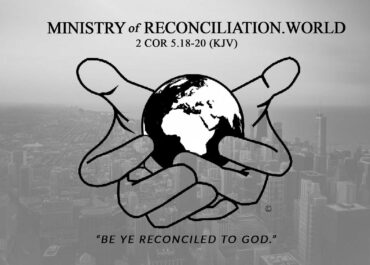 19 To wit, that God was in Christ, reconciling the world unto himself, not imputing their trespasses unto them; and hath committed unto us the word of reconciliation. 2 Corinthians 5:19
19 To wit, that God was in Christ, reconciling the world unto himself, not imputing their trespasses unto them; and hath committed unto us the word of reconciliation. 2 Corinthians 5:19
This is identical to “And hath given to us the ministry of reconciliation” in verse 18. This is announcing the good news that God was in Christ, reconciling the world unto himself. “God was in Christ” indicative of the incarnation.
Notice it is a word of reconciliation not condemnation why? Because God has forgiven them.
Not imputing their trespasses unto them. Not to impute is to forgive (cf. Romans 4:5; Colossians 2:13; 2 Timothy 4:16). The Greek present tense here emphasizes a continuous action….
The most relevant thing in life; Be ye reconciled to God” by the obedience of faith BELIEVE the gospel of Christ in the grace of God (1 Corinthians 15:1-4; Ephesians 2:8-9).
1 Corinthians 15:1-4:
…I declare unto you, primarily looks ahead to verses 3 and 4. The gospel which I preached unto you. The good news which the Corinthians have received … stand … are saved. Paul is now at the very heart of the gospel message. Unless ye have believed in vain. In vain may mean “without cause,” i.e., blind faith (cf. Galatians 2:21). Or it may mean “without effect,” i.e., to no purpose (cf. Galatians 3:4; 4:11)….
The latter idea seems to be best. If, as some are saying in Corinth, there is no resurrection, then faith is vain and worthless (cf. vs. 14).
3–4. First of all, that is, in order of priority. I also received. Paul is not speaking of his personal salvation experience but the fact that the gospel which he preached was from direct revelation of God (cf. 11:23; Galatians 1:12). Four vital truths are asserted here, identified by the word that. That Christ died for our sins. This is a substitutionary and propitiatory sacrifice (cf. Romans 3:23–26). That he was buried. This evidences the reality and totality of his death. That he rose again. The Greek perfect tense stresses the certainty of the fact. According to the scriptures. The facts of the gospel are not only important historically, but prophetically as well. They occurred as had been predicted (cf. John 20:9; Acts 26:23; Psalms 16:10).
The Gospel Of Christ In The Grace Of God is also referred to as the gospel of grace; the gospel of God, the gospel of peace within.
Ephesians 2:8-9:
8. For by grace are ye saved. The grace mentioned in verse 5. Grace is what God does for man, not what man does for God or for himself. Salvation is God’s greatest gift and man’s greatest need. The Greek perfect tense denotes the certainty of this God-given salvation; we have been saved in the past, and are just as thoroughly saved in the present. We have a perfect salvation. God gives; man receives. Through faith. Grace is God’s provision; faith is man’s appropriation. Faith is not a meritorious act, but the indispensable channel through which man receives God’s free gift (Hebrews 11:6). And that. the fact of being saved by grace on God’s part and conditioned on faith on man’s part. Not of yourselves. Not through your merits or efforts. It is the free gift of God. Humble yourself BELIEVE RECEIVE both the Giver and His gifts.
9. Not of works. Not based upon or produced by the works of man. Lest any man should boast. “He that glorieth, let him glory in the Lord” (1 Corinthians 1:31). *Calvin sums up Paul’s meaning as follows: “In these three phrases,—not of yourselves,—it is the gift of God,—not of works,—he [Paul] embraces the substance of his long argument in the Epistles to the Romans and to the Galatians, that righteousness comes to us from the mercy of God alone,—is offered to us in Christ by the gospel,—and is received by faith alone, without the merit of works”….
*Not A Calvinist but I exercise my liberty to select and use what I determine as an element of truth. In addition, the body of Christ is nondenominational, therefore MOR.W is also nondenominational.